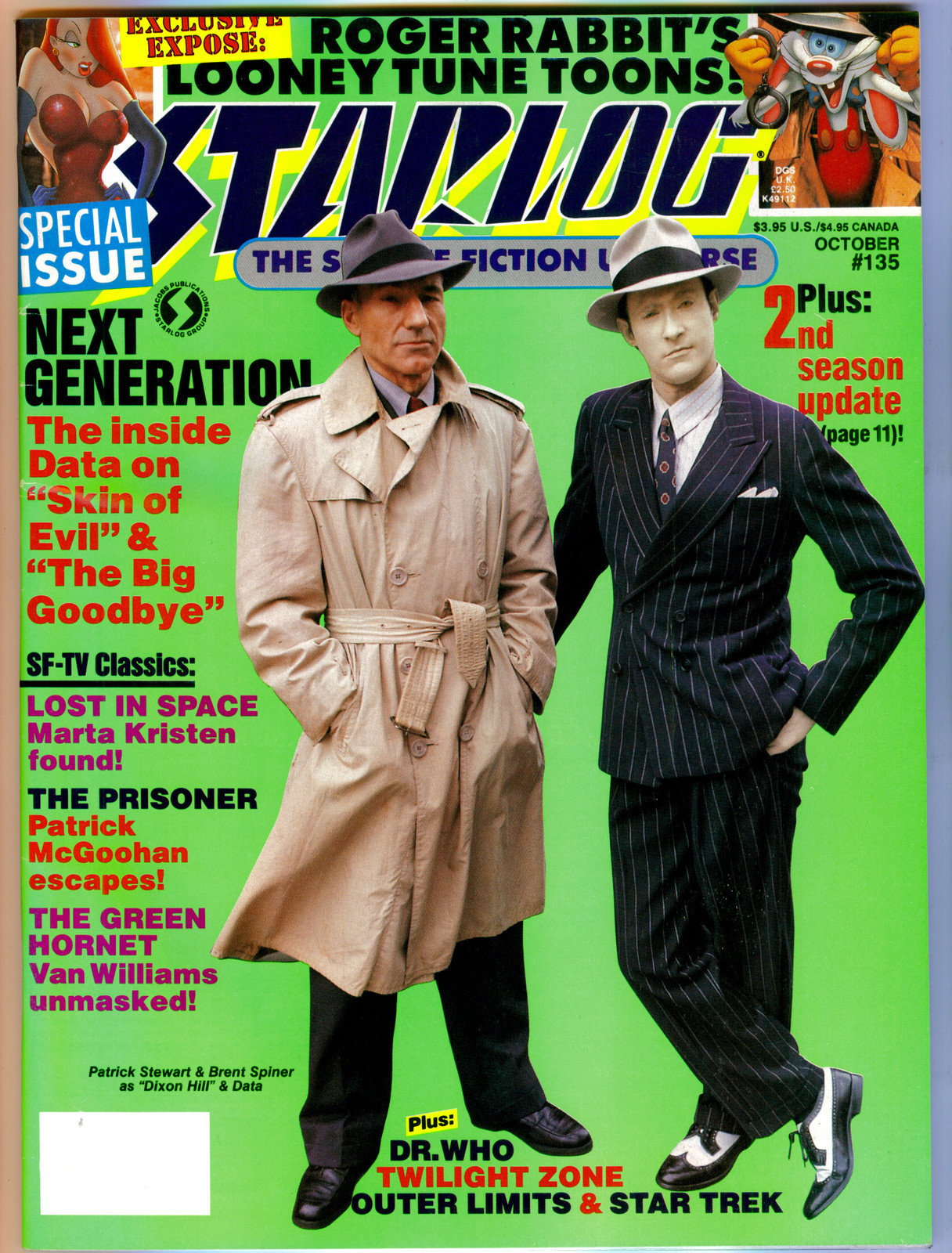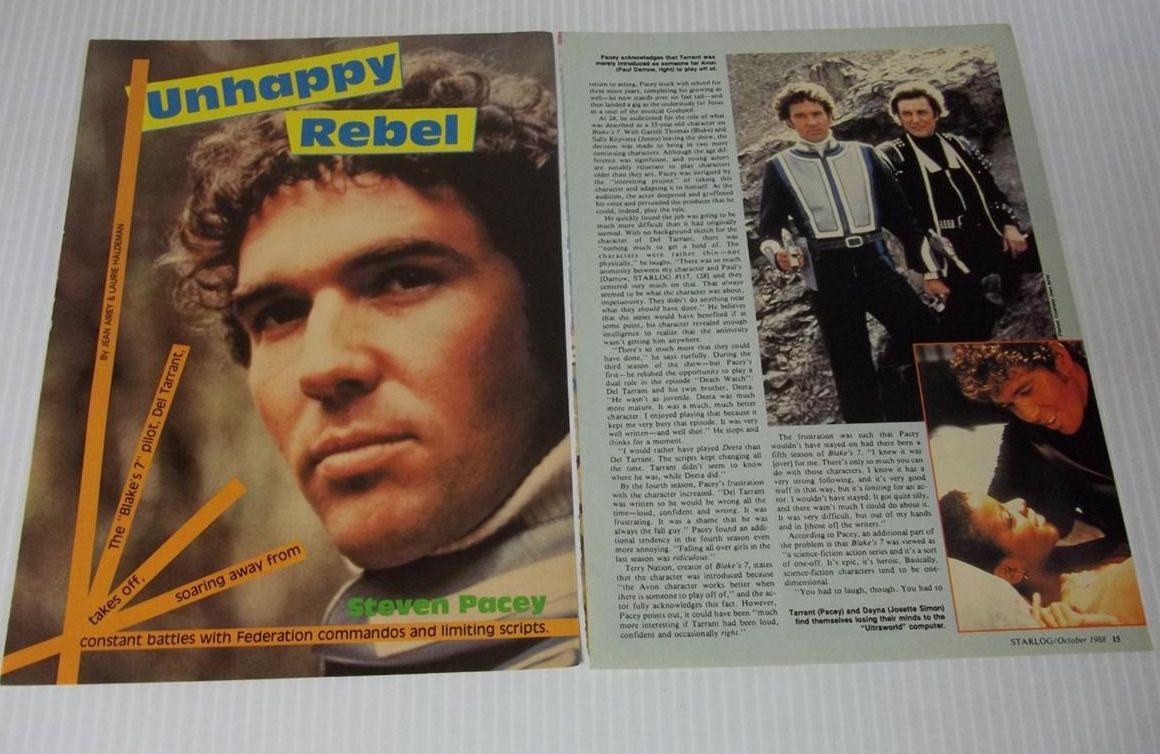Unhappy Rebel
Starlog Issue #135
Unhappy Rebel
A chat with Steven Pacey who played Tarrant in the classic cult
series Blake’s 7.by Jean Airey and Laurie Haldmen
Star Log Magazine, October 1988, #135
Source
Verbatim TranscriptIf a Blake’s 7 fan were watching a performance of the musical High Society in January 1988 on London’s West End, the actor playing the role of Macaulay (Mike) Connor would seem strangely familiar. Of course, this would be true only if seeing the names on the marquees, in the posters in the London underground (subway), and on the program book had been very carefully avoided. Twinges of recognition would be completely countered by the flattened, easy-drawling western Pennsylvania accent, the pitch-on perfect singing voice and the Fred Astaire/Gene Kelly classic grace as the actor leads the dancers in the “High Society Calypso” opening number. It would have to be the smile that confirms the initial impression. Even 10 years later, it is still a smile “to die for,” as one Blake’s 7 fan put it, and it is as powerful from the stage as from the TV screen.
His Blake’s 7 co-stars Paul Darrow (Avon) and Michael Keating (Vila) joshingly refer to him as “teeth and curls,” and a quick check of the program book indicates that the multi-talent performing on stage is, indeed, Steven Pacey – Tarrant in that classic British science-fiction series.
Pacey’s early career could certainly have predicted this West End appearance. At age six, he wanted to be a comedic actor, and by eight was studying acting at the Florence Moore Theatre Studio in Brighton. He still remembers even at that age having an audience to play to was one of the things he most loved. Appearing in the farce Collapse of the Stout Party with long time theatre veterans Bill Frazer and Peter Jones was no threat for the precocious young actor, and an agent in the audience promptly snapped him up, starting Pacey on what he has described as [sic] Lucius in the film Julius Caesar, along with later Blake’s 7 co-star Michael Keating (STARLOG #18). His television career began with an appearance in the Thames TV series Mother Makes Five wearing a bulky fur coat that belonged to Liberace and, pretending to be a gorilla, chasing a girl around. His youthful talent was equally appreciated by television casting directors and he went on to appear in seven productions in one year.
However, his burgeoning childhood career was about to come to an abrupt halt. “When I was 13, I was doing the role opposite Kenneth More in The Winslow Boy on the West End and I suddenly grew very tall,” the actor comments, relaxing with a lager in a
pub following the evening’s performance of High Society. He smiles ironically, broadcasting an innocent, compelling charm. But charm, talent and good looks weren’t enough to overcome the physical problem that was emerging. One scene in the play called for More to berate the young boy Pacey portrayed, trying to get him to admit he is a thief. As the boy protests his innocence and bursts into tears, the direction called for More to look down at the young actor. But Pacey’s growth spurt meant that by the play’s end, at 5′ 7″, he was taller than More, “which made the whole thing ridiculous! At age 13, I was out of work!!”Although all he wanted to do was to return to acting, Pacey stuck with school for three more years, completing his growing as well – he now stands over six feet tall – and then landed a gig as the understudy for Jesus in a tour of the musical Godspell.
At 24, he auditioned for the role of what was described as a 35-year-old character on Blake’s 7. With Gareth Thomas (Blake) and Sally Knyvette (Jenna) leaving the show, the decision was made to bring in two more continuing characters. Although the age difference was significant, and young actors are notably reluctant to play characters older than they are, Pacey was intrigued by the “interesting project” of taking this character and adapting it to himself. At the audition, the actor deepened and gruffened his voice and persuaded the producer that he could, indeed, play the role.
He quickly found the job was going to be much more difficult than it had originally seemed. With no background sketch for the character of Del Tarrant, there was “nothing much to get a hold of. The characters were rather thin – not physically,” he laughs. “There was so much animosity between my character and Paul’s [Darrow, STARLOG #17, 128] and they centred very much on that. That always seemed to be what the character was about, impetuosity. They didn’t do anything near what they should have done.” He believes that the series would have benefited if at some point, his character revealed enough intelligence to realise that the animosity wasn’t getting him anywhere. “There’s so much more that they could have done,” he says ruefully. During the third season of the show – but Pacey’s first
– he relished the opportunity to play a dual role in the episode “Death Watch”: Del Tarrant and his twin brother, Deeta. “He wasn’t as juvenile. Deeta was much more mature. It was a much, much better character. I enjoyed playing that because it kept me very busy that episode. It was very well written – and well shot.” He stops and thinks for a moment. “I would rather have played Deeta than Del Tarrant. The scripts kept changing all the time. Tarrant didn’t seem to know where he was, while Deeta did.”By the fourth season, Pacey’s frustration with the character increased. “Del Tarrant was written so he would be wrong all the time – loud, confident and wrong. It was frustrating. It was a shame that he was always the fall guy.” Pacey found an additional tendency in the fourth season even more annoying. “Falling all over girls in the last season was ridiculous.” Terry Nation, creator of Blake’s 7, states that the character was introduced because “the Avon character works better when there is someone to play off of,” and the actor fully acknowledges this fact. However, Pacey points out, it could have been “much more interesting if Tarrant had been loud, confident and occasionally right.”
The frustration was such that Pacey wouldn’t have stayed on had there been a fifth season of Blake’s 7. “I knew it was [over] for me. There’s only so much you can do with those characters. I know it has a very strong following, and it’s very good stuff in that way, but it’s limiting for an actor. I wouldn’t have stayed. It got quite silly, and there wasn’t much I could do about it. It was very difficult, but out of my hands and in [those of] the writers.” According to Pacey, an additional part of the problem is that Blake’s 7 was viewed as “a science-fiction action series and it’s a sort of one-off. It’s epic, it’s heroic. Basically, science-fiction characters tend to be one-dimensional.”
“You had to laugh, though. You had to have a sense of humour with Blake’s 7. We all got on strangely well. It’s easy to perform with a company where there is that sense of camaraderie,” he observes, pointing out that the same thing has happened recently in High Society. “You can risk, you can dare, where you couldn’t with somebody you didn’t trust. There was a great deal
of trust between us on Blake’s 7 and it helps a hell of a lot for the silly things you have to do!”Certainly, location shooting on a damp day called for a good sense of humour, especially for the curly-haired actor. One problem that the makeup people faced in such a situation was that the damp weather tended to cause curls to go tighter than the character’s hair was “supposed” to be, as well as creating continuity problems over several days’ time. Lacking portable curling irons, the solution was to require Pacey to wear a plastic rain bonnet when not filming a scene. It was a requirement that he handled with good grace. Another moment when laughter was the only release was when, in the episode “Sand,” he and Jacqueline Pearce (STARLOG #121) had an intimate dialogue
which was supposed to make it apparent that the two characters were attracted to each other. That theory turned out to be all wet, as Pacey had to pass a cube of water to her and it broke, thoroughly drenching both of them.After Blake’s 7, Pacey returned to the theatre and doing voice-overs for commercials, training films and foreign media
productions. “I did a disastrous sitcom – which managed to run for two seasons! – playing a young vicar whom everyone fell in love with.” He also appeared in the mystery series Lovejoy playing an “Australian homosexual – possibly. Well, we weren’t really sure if he was or not, you see there were these two characters who wound up being a fraud squad and they were playing at being gay. You didn’t know if they actually were or not at the end.” He had great fun with the part and enjoyed the ambiguity.His ability to sing and dance helped keep him from being “typecast” as the intrepid but wrong space pilot/pirate he characterised in Blake’s 7. “Thank God for that!” he exclaims. “If you can sing and dance, you get asked to do musicals.” However, this particular run was very gruelling, “I must have lost nearly a stone [about 40 pounds] doing High Society.” He is debating putting the musical world behind, commenting, “I think I’ll hang my tap shoes up after this.” But there are other projects planned for the future – following a vacation in Hong Kong with his wife, whom he met while making the Lovejoy episode.
He confesses that he would enjoy coming over to America and meeting Blake’s 7 fans. Many American fans have already had an
opportunity to meet him after his theatre performance in England and he has enjoyed the experience. The only problem is, Steven Pacey laughs, “fitting it in between the work!”

